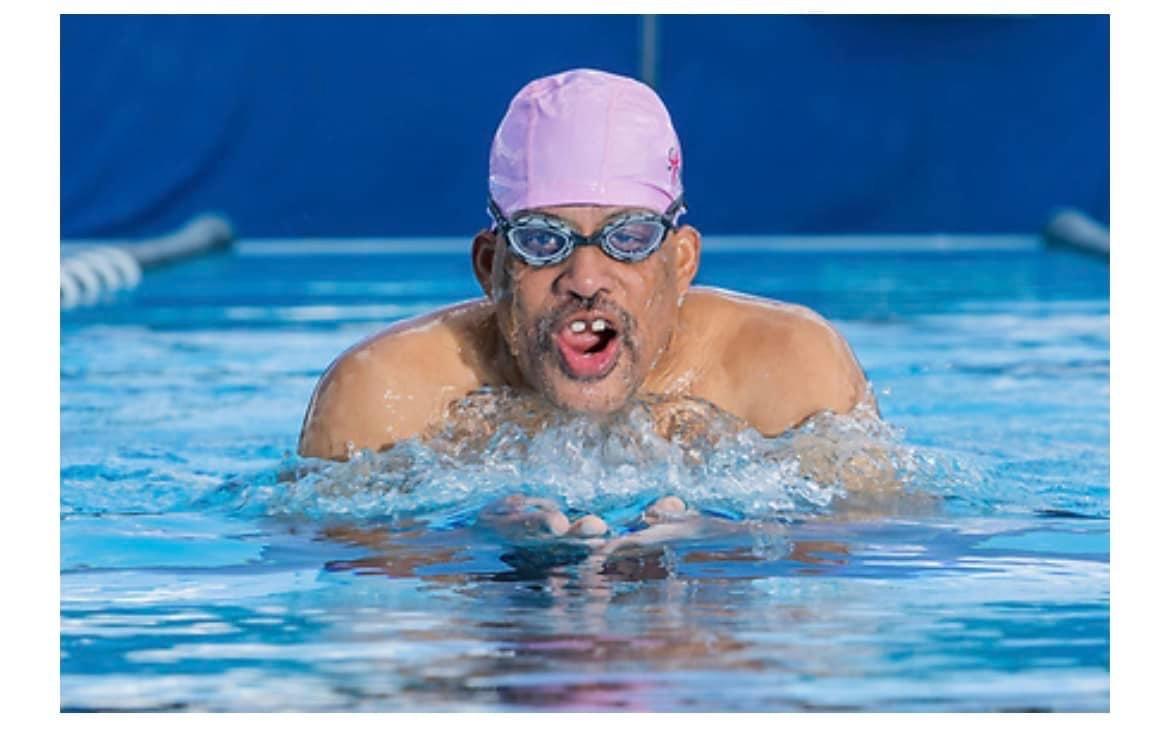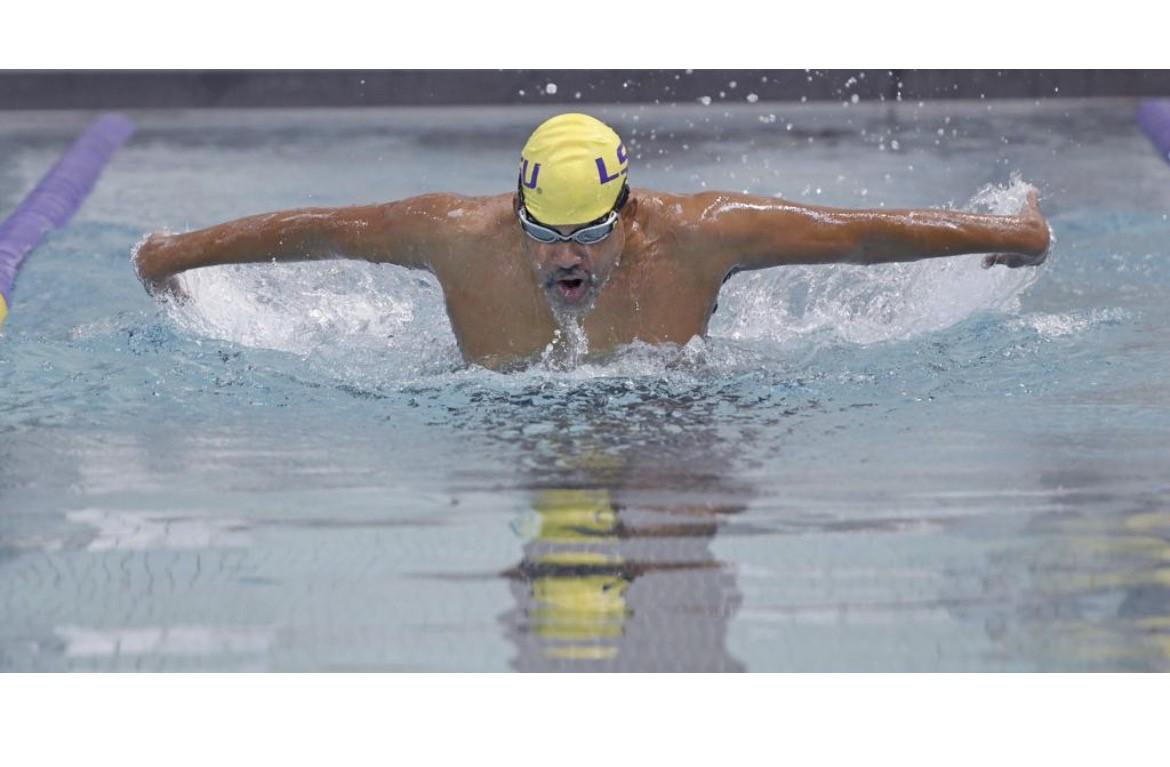Herman Kelly gets up every morning at 4:30 a.m. and trains in the pool for competitive swimming competitions. Now 68 years old, Kelly is a state champion for senior swimming.
But by day, Kelly is a professor at LSU’s African and African American Studies Department. Early in the morning before the light of day, he swims before his classes. Kelly swims three to five miles weekly in the pool at Crawfish Aquatics, a swim club in Baton Rouge.
Kelly swam competitively in high school and college, but eventually stopped.
After undergoing health problems in 2015, his doctor told him he had to improve his health due to high blood pressure and cholesterol issues.
“I talked to my family, and my son, mainly my son,” Kelly said. “And he said, ‘Dad, why don’t you try to swim competitively again?’”
Soon after, Kelly began training at the Natatorium with the help of a couple of friends. By 2018, he entered his first state swimming competition for individuals aged 65 to 69. It was at this event, called The Senior Games, that he won three events, earning the number one title in the 65 to 69 division in Louisiana, qualifying for nationals in the same division.
“My goal is to be a national champion by the time I’m 75,” Kelly said. “So far, I’m doing good. I’m going up.”
The National Senior Games took place in Albuquerque, New Mexico, in 2019, and Kelly landed in 22nd place in two events and 18th in another.
Returning in May 2022, Kelly competed again and ranked 14th in the nation..
“When I win, in my mind, I say, ‘Wow. It was worth it. I really didn’t want to get out of bed last Wednesday, but it’s worth it. I did good,’” he said.
Kelly finds himself in the pool three to four times a week. He also teaches swimming lessons at Crawfish Aquatics to children and adults, sometimes being in the pool six days a week. He said all of the training is worth it.
“It saved my life,” Kelly said. “What I mean by that, my wife passed away in August 2021, and it kind of helped me balance my life. Swimming helps me heal, and once I started doing it, it not only helps me mentally, it helps me heal physically.”
Kelly said he’s in the best shape he’s been in since he was a young man, graduating from high school in Jacksonville, Florida, and graduating from college in Atlanta, Georgia. Ironically, he trains so much that his doctor advised him to cut back a bit on training to ensure he doesn’t over exhaust and exert himself.
In 2018, Kelly remembered how one particular competitor beat him in the butterfly. In 2022, Kelly beat the same competitor. He believes his own swimming times are okay, but that he could do better. He always pushes himself to do better, he said.
Kelly’s biggest competitor is a man from Vermont who he’ll see again in the next nationals competition taking place in Pittsburgh next July.
“Now, I beat him in Albuquerque, but he beat me in Florida. So I’ll see him in Pittsburgh,” Kelly said. “I’ll see him in Pittsburgh.”
A lot of his colleagues push him to keep swimming and he receives community support, Kelly said.
Roland Mitchell, the interim dean for the College of Human Sciences and Education, has known Kelly since 2007 when they were both members of the LSU Black Faculty and Staff Caucus. Mitchell, himself an early riser, said he would see Kelly early in the morning.
“He was always just so friendly,” Mitchell said. “I would literally look at him be like, ‘What can I do to get some of that energy and some of that positivity?’ because Dr. Kelly was always just so positive.”
Mitchell described Kelly as a “workout warrior.” When Kelly began swimming again, Mitchell saw the change in his body and energy level. Even through rough times, Mitchell said that Kelly, also a minister, took the time to engage in the community.
“He went from out-of-shape, almost needing meds, to an Olympic champion,” Mitchell said. “I mean, you can’t make this stuff up. You can’t make it up. He’s amazing.”
According to Mitchell, Kelly is the walking embodiment of his community. He had the right spirit, academic commitment and activeness in campus life to motivate those around him.
When graduate student Justin Martin took Kelly’s civil rights course in the spring 2020, he noticed how lively Kelly was during class. Kelly has connections to the local civil rights community and was able to talk about his experiences in local civil rights events.
Martin said the course sparked an even greater interest for civil rights within him. The course motivated Martin to pursue graduate school in the history department, focusing his research on the civil rights movement era in the U.S.
“His passion comes across in everything he does with teaching, whether it’s bringing in new material, the way he delivers the material, the way he makes it feel very real and alive to students,” Martin said.
It was an amazing class with an amazing professor, Martin said.
Kelly still finds himself training in the pool every week at 4:30 a.m., the same place that saved his life in 2015.
“I’m thankful for the craft God gave me,” Kelly said. “This is a gift, and I want to honor God by doing the best with my gift. Sometimes I complain that I don’t have the gifts other people have, but then I’m thankful for this gift because not only does it make me healthy, but I can also teach other people to save their life.”









